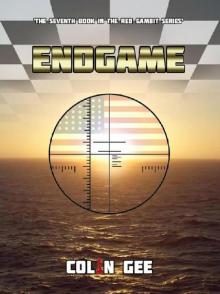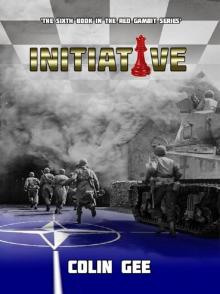Endgame (The Red Gambit Series Book 7) Read online
Page 5
Within seconds the searchlights started going out, which created an artificial darkness as their eyes attempted to readjust to the normal night light.
Tezeren stuck the dead pipe back in his mouth and lit it up again, weighing up his options and deciding that the agreed plan would be sufficient for his needs.
“A secret passage would have been better, but we have prevented disaster, so our political masters will understand, I’m sure.”
He slapped the younger man on the shoulder.
“You did very well, Aydan, very well. I’ll ensure that your part is known. But now we must ensure that any wagging tongues are encouraged to silence.”
Inside, Tezeren was seething, both with Mimaroğlu and with whichever goat-shagging clown had fucked up with the time on the messages, carefully ignoring the fact that he should probably have been aware of the Gayret’s secret schedule himself.
Aydan Mimaroğlu took a final look at the submarines making passage before returning to the command centre to issue the orders his Admiral required.
Koramiral Tezeren took his leave to rendezvous with a boat sent ashore by and containing the puzzled commander of the Gayret, intent on ensuring that no official report would be made of the evening’s events.
The CNFC building returned to something approaching normal and Mimaroğlu accepted iced water and some oranges.
As he peeled the fruit, his eyes would not stray from the rough sketches he had made and the estimates he had pencilled in on the dimensions of the two huge submarines.
‘Well over one hundred metres in length… well over…’
‘Huge conning tower extended structure behind it…’
‘Ramp…’
The image was actually remarkably accurate, but very few would have ever recognised it as an I-400 class Sen-Toku submarine of the Imperial Japanese Navy.
Submariners are a special brotherhood. Either all come to the surface or no one does. On a submarine, the phrase all for one and one for all is not just a slogan, but a reality.
Rudolf Golosov, Vice Admiral, Russian Navy.
Chapter 174 – ZAENSHINBUNRIKI
September 1946
The Swedes maintained the Camp Vár facility at Lungsnäs so that both sides had a meeting place to bring concerns.
Permanent missions were established on the steadily expanding site, and often the different groups were seen to relax together when the business of representing their own national interests had been discharged.
As ever, the intelligence agencies increased their clandestine presence, each hoping to find some piece of information to give their side advantage in the ongoing negotiations.
In capital cities across the globe, some pieces of snatched conversations were refined into hard intelligence and presented to heads of state by intelligence chiefs, keen to give their country the edge.
On the frontlines, the business of relocation carried on, improved by a lowering of tension across the board, and a lack of any clashes or incidents of note.
1822 hrs, Sunday, 1st September 1946, Mimaroğlu’s private residence, Dumlupinar Cd, Suluca, Turkey.
Adding some iced water to the fig raki, Mimaroğlu passed one glass to his friend before relaxing back into his rattan chair to enjoy the light sea breeze blowing up the Dardanelles from the Mediterranean.
Commander Mohammed Nadir cleared his mouth of cheese and olives.
“Very decent of the Koramiral.”
They clinked glasses and savoured the exceptional quality raki, enjoying the unusual distinctive taste.
“Now that’s special. Never had any before… very nice.”
Mimaroğlu nodded as he added some cheese to the mix.
“I wish I knew what that was all about, Maymun.”
The two had been friends for as long as they could remember, so the informality of Nadir’s school nickname flowed easily from his commander’s lips.
“Well, at least you saw the things. I’ve only got your words and that sketch to go on.”
Feeling hot, Nadir pulled out his handkerchief and mopped the sudden rivulets of sweat from his brow.
“I will send it to old Öz. He’ll have an idea about them.”
Feeling hot suddenly, Mimaroğlu grabbed for the small towel and plunged his face into it.
His stomach contents flooded his mouth and spilled into the towel.
“Aydan? Aydan?”
Nadir leant across to put his hand on his friend’s shoulder but never got there as he vomited across the small table.
He collapsed onto the tiled verandah, grabbing his stomach as he added more vomit to the growing puddle.
Mimaroğlu dropped onto his knees alongside him, groaning with pain.
By now, both were dry retching, there being no more stomach contents to bring up.
Struggling for breath, Nadir managed to speak.
“Bad cheese…”
He retched again and fell into a coughing fit that brought forth excruciating pain.
Mimaroğlu understood the situation with clarity, despite the pain and shortness of breath.
“Tezeren… that bastard… he’s poisoned us…”
Both men wheezed as their respiration became more difficult.
Mimaroğlu, coughing and retching, strained and defecated in his robe.
In a small fishing boat roughly a kilometre from the shore, a pair of eyes examined the scene with satisfaction.
The owner lowered the binoculars and nodded to the man by his side, who jumped up on deck and instructed that the sail be set.
Ashore, two heavily built men saw the signal and moved towards Mimaroğlu’s residence.
By the time they worked their way around to the rear, the two naval officers were both dead.
Following their instructions precisely, they removed the glasses and bottle, and replaced the latter with less tainted fare.
One disappeared inside the house and washed up the glasses, replacing them on the table and adding a good measure of the second bottle’s contents.
The fig raki given to Mimaroğlu by a grateful Tezeren contained a lethal reduction of Oleander and was not to be left to be found by any investigators.
Walking away from the death scene, the senior man went to empty the bottle but realised that the road was becoming busy so retained it until the pair were some distance away.
Checking around him, the NKVD agent tossed the bottle over the edge of the hill towards the rocks below.
Twenty minutes later, Tezeren’s staff car drove along.
On the outskirts of Lapseki, at the junction of Bursa Ҫannakale Yolu and Gulpempe Sk, he noted the yellow-clad woman peddling her street foods.
‘Yellow. Excellent.’
The simple colour code told him all he needed to know, so the rest of his journey to Naval Headquarters was free from the worries that had been plaguing him since the searchlights highlighted the submarines the previous evening.
The sole outstanding problem had been Mimaroğlu and his well-known independence of thought.
Tezeren mentally checked off his list and satisfied himself that the lid had been put on the problem. The woman’s yellow garb indicated success in the mission the Russians had insisted upon; in truth, it was a course of action that Tezeren had hardly resisted.
By the time he dozed off, the four submarines of the Imperial Japanese Navy had sunk to the seabed off the coast of the island of Kinaliada, ready for the renewed night to cover their move through the tighter Bosphorus channel at Istanbul, and on into the Black Sea.
The sketch of the submarines had blown off the table and lay in the bushes next to Mimaroglu’s patio, unseen by the NKVD clean-up party, or the police who attended the scene of the two unfortunate deaths.
0952 hrs, Monday, 2nd September 1946, Headquarters, NATO Forces in Europe, Frankfurt, Germany.
“Thank you for seeing me at such short notice, General Strong.”
“Your message seemed to imply urgency, General Gehlen. Please sit. No secr
ecy issues, unlike your last visit? Tea?”
“Thank you, but no thank you. None at all either, as I’m here on official business anyway. Meeting with our French colleagues at midday. I’ll get straight down to business. I’ve further information about the pumpkin bombs from the May Day parade.”
“You have my full attention.”
“My sources tell me that the original bomb was photographed, but not recovered. A submarine found the wreck of the B-29 on an island near Sweden. I’ll try and get the location if I can.”
Strong scribbled a note to that effect.
“I’ve lost two agents getting this information, including the one who took the Moscow photographs.”
“I’m very sorry to hear that, General Gehlen. Very sorry indeed.”
“My prime source is lying low for now… safe… I sincerely hope anyway.”
“I hope your agent remains undiscovered.”
“Thank you. I hope this is worth the cost. I’ve established that the bombs were fakes… copies built from the photographs their submariners took, nothing more. Their insides are now high-explosive in nature… in the bombs recently manufactured for real I mean... these were simply wooden mock-ups of the photographed device.”
“That’s wonderful news.”
Gehlen slid a folder across the crowded desk.
“It is and it isn’t, General Strong.”
Strong read the document carefully.
“Stakhanovo?”
“We’ve known about it for some time. Testing of experimental aircraft… that type of thing. It’s a site we don’t reconnoitre in any way… lost too many aircraft trying… although I recently managed to get an asset in place.”
“And they have B-29s there… and loading pits of the same style as Karup?”
“Indeed, General Strong. They also are preparing to receive a new Soviet aircraft, a virtual copy of the Amerikan B-29… the Tupolev 4.”
“So they’re developing a strategic bombing capability.”
“You didn’t really expect them not to, did you?”
“No, of course not, General Gehlen.”
“But there is more… information that raises sinister possibilities, General Strong.”
Strong sipped his tea.
“Go on, General.”
“My agent communicated that there are two personnel from a special department on site, liaising with the base commander and the regimental technical branch.”
“I’m not going to like this, am I?”
“I’m not sure you will, Herr General, especially if you know what the Ministry for Middle Machinery is, that is?”
“One moment, General Gehlen.”
Strong picked up the phone and issued an instruction.
Within moments, the requested folder was in his hand.
He apprised himself of the contents, which took surprisingly little time.
Handing over the folder, he picked up his tea once more, summarising in between sips.
“Seems we know of its existence through a couple of mentions in their signals traffic… before they changed their codes regularly… damn effective that has been too I might add… anyway, we’ve assumed it’s some agricultural department… no more than tha…”
Gehlen’s look made him stop in mid-flow.
“You know different though. Don’t you?”
“Yes, General, I’m think I do. Acquiring this information cost me another long-standing and excellent agent, and cost her considerably more than that from what I expect. None the less, whilst I know little of what the Ministry for Middle Machinery is concerned with, I’m now aware who’s in charge of it.”
Strong finished his tea and set the cup and saucer down with a gentleness that belied his anticipation.
“Malenkov.”
“Malenkov?”
That meant a number of things, the first of which was that the Ministry for Middle Machinery was now something they needed to know about very quickly, for Malenkov had fingers in a number of pies, one of which they knew was to do with aircraft production, and one of which they had suspected, ever since a report had placed him in a one to one meeting with Kurchatov… the atomic scientist.
1230 hrs, Monday, 2nd September 1946, Headquarters, NATO Forces in Europe, Frankfurt, Germany.
The monthly exchange between German Military Intelligence and the Bureau Central de Renseignements et D’Action had run its normal course.
De Walle had encouraged him to remain behind when the others left the room.
They slipped naturally into German as their preferred language for private discussion.
“How may I be of assistance, General De Walle?”
“A mutual acquaintance received a mysterious note a while back. I wondered if your agency could shed any light on its contents, or provide me with some background on the originator of it?”
“Most certainly I can try, Herr General.”
A copy of the copy of Anne-Marie’s note changed hands and De Walle watched closely for any reaction from the man whom he had only recently started to trust.
“Uspenka clearly. That’s in Russia… near Luhansk if memory serves. We had some suspicions about underground works there. I had one of my people check it all out. Came to nothing.”
He lowered the paper to the desk.
“The rest means nothing to me. I’ll show it to some people. We’ll see what comes up. This name?”
“David Steyn, cousin to Ernst Knocke.”
“Ah, the famous tank general… still in the French Legion from what I heard. Declined to return to serve his Fatherland.”
“Yes, he remained true to his word… something I, for one, am truly grateful for.”
“Steyn? A Jew?”
“I believe so. I’m sure you knew that not all the SS were rabid anti-Semites.”
“Just most.”
De Walle conceded the statement with a typically Gallic shrug.
“On that subject, Knocke seems to think that his cousin was supposed to have died in Belzec, along with his uncle Jakob, a medical doctor.”
“And you think this is important?”
“I’m unsure to be honest. But Knocke seems to suspect that Steyn was more than the simple shopkeeper he appeared to be… an ex-Kriegsmarine engineer who may have other skills… official contacts possibly… perhaps even a clandestine life… don’t know…. but I do know you’re better placed to discover the truth of the matter.”
“May I?”
“But of course.”
Gehlen responded by marking a couple of extra notes on the message and then pocketed the paperwork.
“Leave it with me, Herr General. Now, I must go and see Vietinghoff before I travel on.”
“Thank you, Herr General. My regards to your family.”
2100 hrs, Saturday, 7th September 1946, Vinogradar Young Communists Sailing Club, Black Sea, USSR.
The pilot boats had made contact and the mammoth voyage was nearly complete.
On the stroke of 2100 hrs, the hydraulic doors that separated the Black Sea from the secret facility started their slow journey, permitting a soft red light to play upon the gentle swell outside.
Inside the facility, six sets of red lights pulsated, hidden from any view save the eyes aboard the vessels carefully approaching the entrance.
The order of arrival was decided by the Japanese themselves, and the pilot boat flashed its lights towards the red cavern, silently communicating which vessel was first in line.
Inside the facility, the red lights extinguished until solely one set was illuminated, along with a matching green set, the two colours marking the hospitable darkness of the welcoming mooring bay into which the AM class I-1 would slide.
The sea doors themselves were marked by an array of low power red and green lights arranged in the same pattern as the mooring bays, with red to port and green to starboard.
The arrival took eight minutes precisely; longer than the five and a half minutes achieved by the practiced crews of
J-51 Soviet Initsiativa and J-54 Soviet Vozmezdiye… or Initiative and Retribution as official circles knew them… or Jana and Velika as those who manned them affectionately called the two type-XXI submarines.
Next came one of the real leviathans, the I-402 displaying the shielded blue light on her conning tower, which meant that she was the one that carried the all-important hardware upon which the later stages of Raduga so heavily depended.
402 took eleven minutes to berth, the turn into her resting place proving tighter than imagined when the plans were altered to accommodate the immense Sen-Tokus.
The transport was already in place to accept the precious machinery, the berth normally occupied by ‘Jana’ filled by a sturdy new diesel engine powered barge that would take the delicate instruments from Vinogradar on the journey across the Black sea, into the Volga, to their final destination at Akhtubinsk and Camp 1001.
There was another similar dilapidated-looking barge in a vacant bay adjacent to 401.
Fig # 224 - Important locations in Southern USSR.
The barges were carefully constructed to look like anything but a modern piece of seagoing transport, the maskirovka so good that the Japanese conning tower crews wondered why such tramp-like vessels were moored within the secret facility.
The Soviet scientist thronged the bays, waiting to have first sight of the machines that promised so much.
The plans had already been with them for months, and copies had been made. However, results had been poor by comparison with the Japanese claims, so the Soviets were anxious to see the technical differences between their own attempts and the ones that were about to be unloaded from the hangar on I-402.
The arrival of I-401 was almost a non-event for most of the people present, although it carried some equally important substances, paperwork, and personnel.
Last into the base was I-14.
Her stern almost clipped the doorframe but the Captain skilfully applied some extra revolutions to avoid contact and the AM class submarine moored perfectly.

 Sacrifice (The Red Gambit Series. Book 5)
Sacrifice (The Red Gambit Series. Book 5) Endgame (The Red Gambit Series Book 7)
Endgame (The Red Gambit Series Book 7) Initiative (The Red Gambit Series Book 6)
Initiative (The Red Gambit Series Book 6)